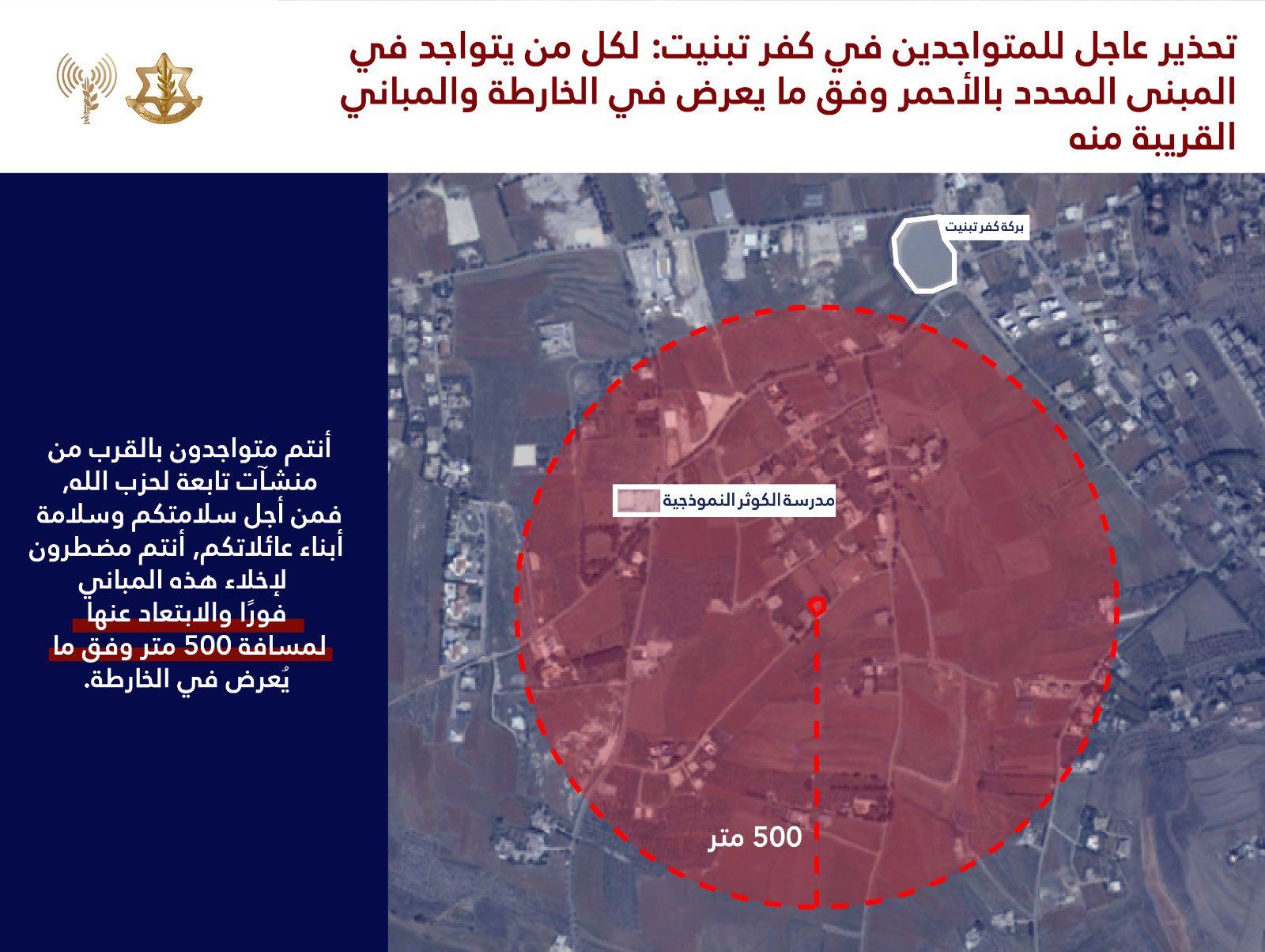
A series of Israeli raids targeted several villages in southern Lebanon on Thursday, following evacuation warnings issued to residents by the Israeli army.
The towns of Mays al-Jabal, Kfar tebnit and Debbin were targeted late afternoon after the Israeli army issued an urgent warning to residents of several villages in southern Lebanon, cautioning of imminent strikes on what it described as Hezbollah military infrastructure. A Syrian national was injured in Mays el-Jabal, according to the Ministry of Health.
The Israeli army’s Arabic-language spokesperson Avichay Adraee identified the villages of Mays al-Jabal, Kfar Tibnit and Debbin as areas where buildings allegedly used by Hezbollah have been marked. He urged residents to evacuate the designated sites as well as adjacent structures and to move at least 500 meters away. “Remaining inside the buildings puts your lives at risk,” the warning stated.
https://x.com/avichayadraee/status/1968672488725876882?s=48&t=YatfRHGLEWWrEaKB1yGifw
A new warning was issued following the first series of strikes, calling for the evacuation of the Chehabiyyé and Borj Kalawiyeh areas, which were indeed targeted shortly afterward.
#عاجل 🔴 انذار عاجل إلى سكان جنوب لبنان
— افيخاي ادرعي (@AvichayAdraee) September 18, 2025
🔸سيهاجم جيش الدفاع على المدى الزمني القريب بنى تحتية عسكرية تابعة لحزب الله الإرهابي في انحاء جنوب لبنان وذلك في مواجهة محاولاته المحظورة لاعادة اعمار أنشطتها في المنطقة
🔸نوجّه تحذيرًا عاجلًا إلى سكان المباني المحددة بالأحمر في الخرائط… pic.twitter.com/36fTILJ59U
These attacks were followed later in the evening by the dropping of several bombs on a fishing port in Naqoura.
Such direct alerts to civilians have been rare in recent months. The last time a warning of this kind was issued in June 2025, when Adraee called on residents of Beirut’s southern suburbs and parts of Nabatieh Governorate to evacuate buildings allegedly used by Hezbollah before airstrikes on what the army said were underground drone facilities.
Lebanese Officials Condemn Wave of Israeli Raids
The President of the Republic, Joseph Aoun, condemned the Israeli strikes that targeted southern localities on Thursday, following similar attacks that recently affected areas in the Bekaa.
“Israel respects neither the functioning of the mechanism nor any of the guarantor states of the ceasefire agreement, and its airstrikes constitute a blatant violation of Security Council Resolution 1701,” Aoun stated, adding, “The silence of the guarantor states of the ceasefire agreement is a serious failure that encourages these aggressions.”
“The monitoring mechanism must serve all parties and not be used to cover up Israel’s attacks. It is high time to put an immediate end to these blatant violations of Lebanese sovereignty,” he affirmed.
In response to the Israeli army’s warnings, Lebanese Prime Minister Nawaf Salam stated that Beirut would not submit to “media blackmail.” In a post on his account on X, Salam affirmed Lebanon’s commitment to halting hostilities and engaging in mechanism meetings to maintain calm. He questioned Israel’s adherence to these frameworks: “Where is Israel’s commitment to these mechanisms? How can it continue intimidation and aggression, when these meetings are supposed to ensure full implementation of UN Security Council Resolution 1701 and the cessation of hostilities?”
The Prime minister called on the international community, especially the sponsors of the ceasefire arrangements, to exert maximum pressure on Israel to stop its attacks immediately, return to the agreed mechanisms, and respect its commitments. Salam also reiterated Lebanon’s demands, including Israel’s withdrawal from Lebanese territory where it is still present, an end to repeated violations, and the release of detainees.
Parliament Speaker Nabih Berri also warned that Israeli attacks on southern villages and as far as Baalbek have surpassed 4,500 violations, turning from ceasefire breaches into “an assault on Lebanon, its sovereignty, its army, and UNIFIL.” He accused Israel of obstructing the full implementation of UN Resolution 1701, which Lebanon has committed to. Berri urged the international community, especially the United States, to pressure Israel to stop its attacks.”
For its part, the Lebanese army stated that the Israeli attacks “hinder the army’s deployment in the South, and their continuation risks compromising the implementation of its plan starting from the area south of the Litani.”
In a statement published Thursday evening on X, the army reported more than “4,500 violations of the ceasefire” concluded in 2024.
The army also announced that “a specialized military unit discovered in Labbouneh (Tyre region) a camouflaged Israeli espionage device.” It added that “the army dismantled it, while its command continues to monitor these violations in coordination with the Ceasefire Supervision Commission and the United Nations Interim Force in Lebanon (UNIFIL).”



Comments